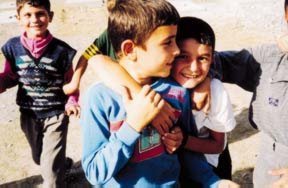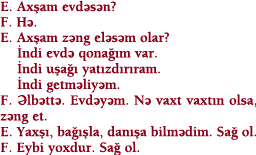|

Winter
1999 (7.4)
Sociolinguistically
Speaking - Part 5
Saying
Goodbye
by Jala
Garibova and Betty Blair
You are welcome to reproduce these Sociolinguistic articles
for individual or educational study.
  Recently
an Azerbaijani family was saying goodbye to their hosts after
enjoying dinner and an evening together, and their child started
down the stairs on his own. His parents stopped him and made
him come back and say goodbye. It didn't matter that the child
was only four years old. Goodbyes are a crucial part of etiquette
in Azerbaijan. They are often elaborate and drawn out depending
upon the situation and relationship. To show respect, you say
goodbye to your hosts at a party, your professor or teacher,
your classmates, your co-workers, the shop clerk who helped you
in a store, and even your cab driver. In all cases, these goodbye
phrases contain a wish for continued well-being. Recently
an Azerbaijani family was saying goodbye to their hosts after
enjoying dinner and an evening together, and their child started
down the stairs on his own. His parents stopped him and made
him come back and say goodbye. It didn't matter that the child
was only four years old. Goodbyes are a crucial part of etiquette
in Azerbaijan. They are often elaborate and drawn out depending
upon the situation and relationship. To show respect, you say
goodbye to your hosts at a party, your professor or teacher,
your classmates, your co-workers, the shop clerk who helped you
in a store, and even your cab driver. In all cases, these goodbye
phrases contain a wish for continued well-being.
Photo: Blair, Sabirabad Refugee Camp, Summer
1999.

This word doubles
for "Thanks" and "Goodbye" in both singular
and plural forms.

So long!
The reply can
be the same, plus additional wishes.

Have a safe trip home. (Good way).

Go smiling. (Smiling-smiling).

Go happy (singular / plural).

See you.

Until we meet.

Come often.
Often, a simple
exchange of goodbyes consists of three, four, or even more phrases.
In the evening, you may say "Good night" rather than
"Goodbye".

A. All right.
So long. We'll leave. Thanks a lot.
B. Goodbye. Good way. Go smiling. Come often.
A. You come to our place, too.
B. If God wills.
A. Good night. (May goodness be with you at night.)
B. Good night. (May you encounter goodness.)

C. Thanks for everything. Goodbye.
D. Goodbye. Say hello to your mom.
C. Thanks so much.
D. Next time bring the children.
C. We will, thanks so much. You come to our place, too.
D. OK (Fine).
C. Goodbye. (God be with you.)
D. Goodbye. Good way.
Of course, if
you unexpectedly meet someone in the street, the goodbye procedure
is somewhat briefer. Note that the word  is quite formal and rarely used in everyday situations as it
implies "goodbye forever" (Arabic). You're more likely
to encounter it in literary works and poetry.
is quite formal and rarely used in everyday situations as it
implies "goodbye forever" (Arabic). You're more likely
to encounter it in literary works and poetry.
Greeting Family
Members
It's always appropriate to send greetings to other family members.

 Say hello to your mother. / (plural). Say hello to your mother. / (plural).
 Say hello to your aunt (mother's
side). Say hello to your aunt (mother's
side).
 Say hello to your sister. Say hello to your sister.
 Say hello to your uncle (father's
side). Say hello to your uncle (father's
side).
 Say hello to Lala. Say hello to Lala.
 Say hello to Natig. Say hello to Natig.
At Someone's House
For the sake of propriety, it's important to follow the Azerbaijani
traditional procedures in leave-taking. At a party in someone's
home, for example, it's crucial to say goodbye to the host or
hostess before you leave. If the host happens not to be available
at the moment that you want to leave - perhaps because he's talking
on the telephone - you should wait until you have an opportunity
to say goodbye.
But don't just disappear and slip out the door, it's important
to say goodbye to the other guests as well - always starting
with the elderly ones first. (If there's not more than 20 guests
or so, you should say goodbye to everyone).
Repeat the same physical gestures (hugging, kissing or shaking
hands) that you used earlier that evening. Children are usually
kissed, as are adults who are close friends or relatives.
If you have to leave early, your host will appreciate an explanation.
It's typical for the host to insist several times that you stay
just a bit longer. Explaining why you can't will prevent hurt
feelings.
If you're leaving a dinner party, the host may offer food to
take to other family members who weren't able to come. This is
done so that pregnant women, children, elderly or sick relatives
won't feel left out. The food is not considered "leftovers",
since each person's share was set aside before the food was served.
When seeing guests off, don't close the front door as soon as
your guests leave. Instead, step outside and watch as your guests
walk down the stairs. If you have a courtyard, see your guests
to the street entrance.
Sometimes one set of goodbyes is not enough. After saying goodbye
to the host, its usual for guests to gather in front of the house
and continue talking. When it's time to leave, goodbyes are said
a second time, repeating the same kissing and handshaking routine
that occurred earlier.
There's an Azeri expression: "You can never say 'Go home'
to a guest, but you may pull the mattress out from under him."
  In other words, the guest is made to feel uncomfortable as, for
example, when family members argue or watch TV instead of entertaining
their visitors. The guest considers this disrespectful.
In other words, the guest is made to feel uncomfortable as, for
example, when family members argue or watch TV instead of entertaining
their visitors. The guest considers this disrespectful.
One well-known anecdote talks about guests who don't know when
they've outstayed their welcome: "Molla Nasraddin falls
ill, so his friends and relatives come to visit. They sit around
giving advice and asking questions for such a long time that
Molla gets tired of them. He and his wife don't feel comfortable
telling their visitors to leave, even though Molla needs to rest.
In the end, Molla gets up, puts on his coat and walks out of
the room. When the visitors ask him what he's doing, he says:
'I've recovered. And you can go home.'"
On the Telephone
Ending a telephone conversation should not be done abruptly.
Usually, the person who initiated the phone call is the one who
determines when to finish the conversation. The other person
is expected to be patient and wait until the caller is ready
to close the conversation and say goodbye.
If something urgent comes up and you need to hang up first, apologize
and explain why you have to go. If you don't provide a reason,
the caller might get offended. Before closing, set a time to
call back.

E. Are you going to be home this evening?
F. Yes (colloquial expression, but not used with strangers or
elderly).
E. Is it OK if I call back in the evening?
There are guests at the house.
I'm going to put my child to bed now.
I have to go now.
F. Sure. I'm at home. Call when you have time.
F. OK. Sorry that I couldn't talk. Goodbye.
G. No problem (OK). Goodbye.
On a Journey
When seeing someone off at the airport, train station or bus
stop, the family tends to stay as long as possible before that
person leaves. Instead of just dropping the person off, all the
friends and family members usually go inside the train car and
stay there right up until the loved one must depart. If the person
is going to a distant place, use the following phrases:

Be under God's care.

Take care.
(Meaning, look after yourself well.)

Take care of yourself.

Don't miss.
(Meaning, don't get homesick and miss us).

Call frequently.
The person who
is leaving replies with many of the same phrases and may add:

(Remain) safe and sound.
At a Meeting
In formal, business-related conversations, a goodbye is usually
followed by phrases such as:

So glad to see you.

So glad to meet you.
A phrase often used to preface the goodbye, especially at business
meetings:

If you would permit (singular/ plural)
Before leaving,
a business person is likely to apologize "If you permit,
I must leave because..."
Goodbye to an Audience
Phrases used to say goodbye addressing an audience on TV or radio,
or at a meeting or concert, are different from those used in
everyday situations:

Until future meetings.

Literally, remain with health.

Looking forward to meeting you again.
(Literally, with the desire to meet with you again.)
Weddings
When guests are leaving and thanking the hosts, they often add:

May we meet in happy celebrations.
If the host
knows that the guests have young children in their family, they
may add:

May this also happen to your young ones.
(Meaning, may they get married, too).

From your singles + you see
(Meaning, may single people in your family get married, too).
Funerals
If the occasion is a funeral, the departing guest is expected
to say a phrase such as:

May it be your last grief.

Literally, may God rest the souls of your dead ones.

May we meet in happy celebrations.
Back to Sociolinguistically
Speaking
From Azerbaijan
International
(7.4)
Winter 1999.
© Azerbaijan International 1999. All rights reserved.
Home
| About
Azeri | Learn Azeri
| Contact us
|





